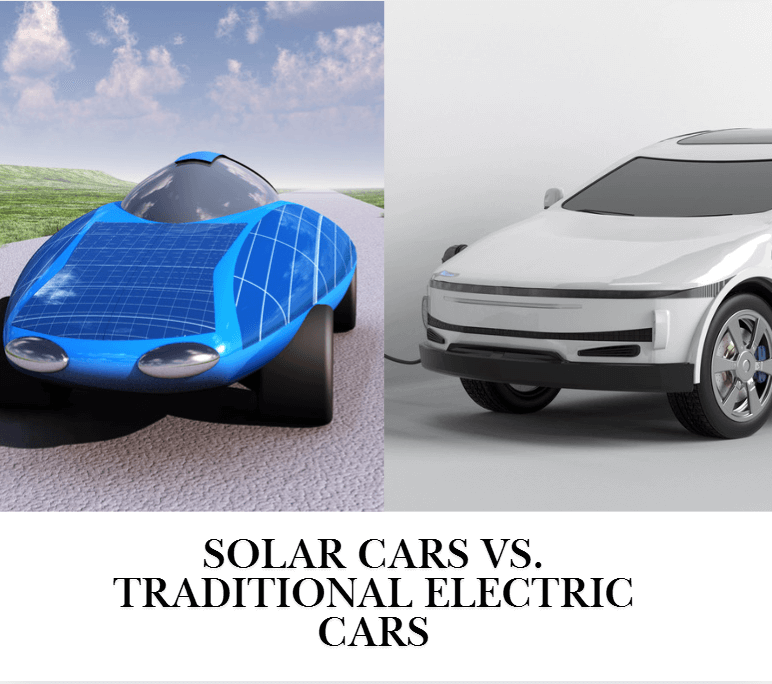You’ll learn that, with climate change and energy sustainability global concerns, both solar-powered and traditional electric vehicles represent innovative steps toward a cleaner future. But how do you compare them? Is one more durable than the other? This post will discuss the differences, advantages and limitations of solar vehicles and traditional electric vehicles (EV). Let’s get started
What is a solar car?
Solar cars, these vehicles use energy directly from sunlight through photovoltaic (PV) panels, usually installed on the roof or body of the car. Solar cells convert sunlight into electricity, which powers the car’s motor and stores excess energy in a battery for later use. While some solar cars are purely solar-powered, many are hybrids that combine solar with conventional charging options.
What are traditional electric cars?
Traditional Electric Vehicles (EV) Electric vehicles operate using electricity stored in high-capacity lithium-ion batteries. They charge by plugging into an external power source, such as a wall outlet or charging station Although they do not rely on sunlight, they do draw power from the grid, which may or may not come from renewable sources depending on the region.
The main difference between solar car and traditional electric car is
Especially the energy source
Solar Cars: Solar powered cars rely on sunlight directly as a source of energy. Photovoltaic panels convert sunlight into electricity, allowing them to generate power independently of the grid. However, they still require batteries to store energy for low-sun hours or nighttime use.
Traditional EV: Traditional electric vehicles rely on grid-based electricity for charging, which can come from a mix of sources (renewable and non-renewable). This dependence on grid electricity depends on their sustainability energy grid’s fuel mix.
Battery requirements are an issue
Solar cars: usually have smaller batteries, as they generate power directly from sunlight during the day. Solar car batteries store energy generated by solar panels and act as a backup in low light conditions.
Traditional EV: rely only on batteries, which are large and must be charged from an external source. These larger batteries offer greater range but come with an environmental cost due to the resources required to produce them.
range and efficiency
Solar cars: Due to the limited surface area for solar panels and variable sunlight, fully solar-powered cars often have a short range. However, hybrid solar EV, which use both solar and traditional electric charging, can offer competitive ranges.
Traditional EV: Known for their wide range, traditional EV benefit from larger batteries and faster charging options. However, their reliance on grid electricity means they are only as clean as the energy they use.

Top 5 Advantages of Solar Cars
Independence from the Power Grid
Solar cars generate their own energy directly from sunlight, allowing them to operate independently of the electric grid. This is especially beneficial in remote or off-grid areas where charging stations may be scarce. Solar cars offer more autonomy, particularly for short trips and daily commuting, reducing dependency on external power sources.
Lower Carbon Footprint
Since solar cars harness energy directly from the sun, they produce zero emissions while operating. Unlike traditional electric cars that may draw power from fossil-fuel-based grids, solar cars rely on clean energy, helping reduce greenhouse gas emissions. This makes them an excellent choice for eco-conscious consumers looking to minimize their environmental impact.
Potential for Cost Savings in Sun-Rich Regions
In areas with ample sunlight, solar cars can lead to significant cost savings over time by reducing the need to charge at power stations. With the vehicle generating its own energy, fuel and electricity costs are minimized. Drivers can enjoy nearly “free” energy as long as there’s enough sun, making solar cars an economical choice in the right climates.
Extended Battery Life
Solar cars can continuously recharge throughout the day while exposed to sunlight, providing a slow, steady stream of energy. This reduces the need for deep discharge and frequent high-capacity charging cycles, which can extend battery lifespan. The consistent trickle charge from solar panels may help maintain optimal battery health over time.
Promotes Innovation and Renewable Technology
Solar cars are at the forefront of renewable energy technology, encouraging advancements in photovoltaic (PV) panels and efficient energy storage. As solar car technology evolves, it drives the development of lighter, more efficient solar cells and sustainable battery solutions, which benefit not only the automotive industry but also other sectors relying on renewable energy.

Best 5 Advantages of Traditional Electric Cars
